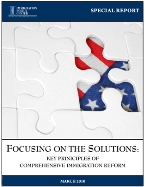I do a daily radio talk show on Radio Campesina in Phoenix and, clearly, since the November elections callers are once more allowing themselves to dream of the day their hard, hidden existence comes to an end. Their dreams are tentative and cautious, but nonetheless hope has been resurrected. Yet in Arizona hope is interspersed with anger. Four anti-immigrant referendums passed overwhelmingly, one of which, Proposition 300, will impose steep tuition increases for undocumented community-college and university students. Most legal observers believe it is constitutional. The only resolution lies now in the hands of Congress. Delay in passing comprehensive immigration reform, or at the very least the DREAM Act (which would provide a path to lawful permanent residence for hundreds of thousands of undocumented high-school graduates), will have immediate and tragic consequences for thousands of Latino kids in Arizona.
Read more...
Published On: Fri, Dec 01, 2006 | Download File




